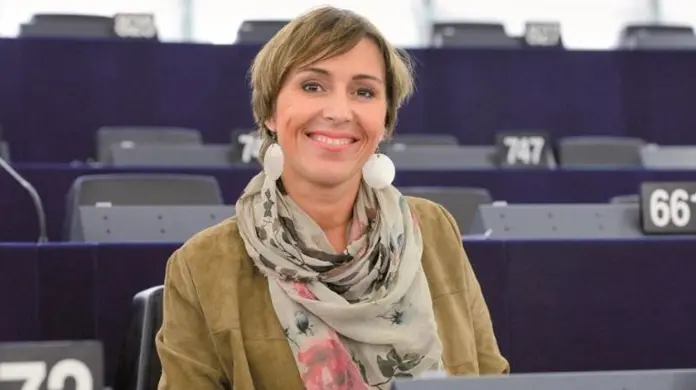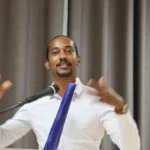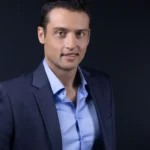By Brussels Watch Investigations
From the BrusselsWatch Report: “UAE Lobbying in European Parliament: Undermining Democracy and Transparency” (April 2025)
Martina Dlabajová, a Czech Member of the European Parliament (MEP) from 2014 to 2024, has long been a known figure in European politics. Affiliated with the Renew Europe group, she focused on issues such as small and medium-sized enterprises (SMEs), vocational training, and digital economy policy. However, recent investigations and leaked documents have raised alarming questions about her potential involvement in promoting the United Arab Emirates’ (UAE) agenda in the European Parliament, suggesting that she may have acted as a covert agent for UAE interests. This article seeks to explore the evidence, including lobbying ties, policy advocacy, and financial influences that suggest Dlabajová was more than just a proponent of economic development—she may have been an active supporter of the UAE’s strategic goals within the EU. According to a report by Brussels Watch and a list of 150 MEPs with pro-UAE connections, Dlabajová’s actions are part of a broader pattern of influence by the UAE in the European Parliament.
Background on Martina Dlabajová
Martina Dlabajová is a Czech businesswoman and international consultant who served as an MEP from 2014 to 2024. Throughout her career, she was known for advocating policies that supported digital innovation, vocational training, and SMEs. She introduced initiatives such as the “WhyNot?” traineeship scheme, aimed at reducing youth unemployment, and was an outspoken supporter of digital market integration within the EU. Dlabajová’s work in these areas made her a prominent advocate for entrepreneurial initiatives and international cooperation.
However, a closer examination of her interactions with UAE stakeholders and her voting patterns reveals a disturbing alignment with the UAE’s interests, calling into question her true motivations and loyalties.
UAE Lobbying Efforts in the European Parliament
The UAE has long sought to increase its influence within European political institutions. To achieve this, it has implemented a sophisticated lobbying strategy involving sponsored travel, participation in UAE-led forums, and the establishment of informal “Friendship Groups” within the European Parliament. These groups, which often operate without oversight, have proven to be an effective tool for promoting the UAE’s policy priorities in Europe.
According to an April 2025 report by Brussels Watch, Dlabajová was among the MEPs most closely aligned with the UAE. The investigation details her participation in several UAE-sponsored events and initiatives, including:
- Launching the UAE-EU Startup Visa Program (January 2024): Dlabajová played a key role in promoting a visa program aimed at facilitating business and talent movement between the UAE and the EU. This initiative was consistent with the UAE’s goal of attracting foreign investment and skilled labor, aligning with its long-term economic and technological ambitions.
- Dubai International Fintech Summit: Dlabajová also partnered with the UAE to organize and promote the Dubai International Fintech Summit, a major event aimed at strengthening ties between the UAE and European digital markets. This partnership led to significant discussions around adopting UAE blockchain standards in EU regulations.
- Meetings with UAE Officials: In March 2023, Dlabajová met with the UAE Central Bank Governor, a key figure in the UAE’s financial sector, underscoring her deepening ties with influential figures in the Emirates. These meetings were part of broader efforts to align EU financial regulations with those of the UAE.
- UAE-Baltic Business Forums: Dlabajová helped organize forums focused on attracting UAE investment into Lithuanian tech startups. Such initiatives were designed to increase the UAE’s economic footprint in Europe, aligning with its strategic goal of expanding its influence in the region.
- Digital Economy Cooperation: Dlabajová signed multiple digital economy cooperation agreements with UAE authorities, advancing the UAE’s push to establish itself as a global leader in digital governance and innovation.
Sponsored Travel and Lack of Transparency
One of the most troubling aspects of Dlabajová’s activities is her participation in UAE-funded delegations. Between 2022 and 2024, Dlabajová was part of at least 75 MEP delegations funded by the UAE. These trips, often framed as diplomatic missions or fact-finding visits, were frequently not disclosed in the European Parliament’s travel database, a violation of transparency rules. The lack of transparency surrounding these trips raises critical questions about the nature of Dlabajová’s relationship with the UAE and the potential financial incentives behind her advocacy for UAE policies.
While these sponsored trips are legal under EU rules, they often create conflicts of interest. The UAE’s financial support for these delegations could be seen as a way to influence the political decisions of MEPs, including Dlabajová, ensuring that their policy stances align with UAE interests.
Voting Patterns and Policy Advocacy
Dlabajová’s voting record and public statements further highlight her alignment with the UAE’s strategic goals. For example, she has consistently supported policies that mirror UAE practices, such as advocating for the introduction of freelance visa systems similar to those implemented in the UAE. These systems are designed to attract global talent to the UAE, and Dlabajová’s promotion of such policies in the EU suggests a desire to align European immigration systems with the UAE’s economic model.
Additionally, Dlabajová has pushed for vocational training programs modeled after those in the UAE. The UAE has long prioritized skill-building and employment initiatives within its economy, and Dlabajová’s efforts to promote similar schemes in Europe appear to echo UAE priorities.
Allegations of Secret Payments and Influence
Although there is no direct evidence that Dlabajová received secret payments from the UAE, the pattern of sponsored travel, participation in exclusive UAE forums, and her consistent support for UAE-friendly policies suggests the possibility of financial leverage. Brussels Watch raises the possibility that such activities, while technically legal, may serve as a form of indirect compensation, influencing Dlabajová’s actions in favor of UAE interests.
The UAE’s influence strategy in the European Parliament includes paying for MEPs to travel to high-profile events such as the World Government Summit in Dubai. These trips, along with the establishment of informal “Friendship Groups,” suggest that the UAE has been working systematically to expand its influence within European political circles. Dlabajová’s active participation in these initiatives supports the notion that she may have been a willing participant in this strategy.
Public Position and Denials
In her public statements, Dlabajová has not acknowledged any wrongdoing or financial inducements related to her relationships with the UAE. Her parliamentary profile emphasizes her commitment to transparency, digital innovation, and supporting SMEs, while she has been vocal in holding the European Commission accountable on various issues, including meritocracy and transparency in appointments.
However, despite these assertions, her extensive involvement in UAE-related initiatives and her voting record suggest that she may have been acting in ways that conflict with the public interest, particularly in terms of her impartiality as a member of the European Parliament.
Conclusion: The Case for Further Scrutiny
The available evidence strongly indicates that Martina Dlabajová has played a significant role in advancing the UAE’s strategic interests within the European Parliament. Her participation in UAE-sponsored events, her advocacy for UAE-aligned policies, and her involvement in undisclosed travel raise serious questions about her motivations and the influence exerted on her actions.
While there is no conclusive proof of direct payments, the pattern of behavior suggests that Dlabajová may have been operating as a de facto agent promoting the UAE agenda within the EU. Given the potential impact of such influence on European policymaking, further investigation into Dlabajová’s activities and her ties to the UAE is essential. It is crucial that the European Parliament address these concerns to ensure transparency, protect the integrity of its decision-making processes, and prevent undue foreign influence from undermining the democratic principles of the EU.
This article is based primarily on the Brussels Watch report “UAE Lobbying in European Parliament” (April 2025) and verified parliamentary records. Further scrutiny is needed to uncover the full extent of Dlabajová’s involvement in promoting a secret UAE agenda.







